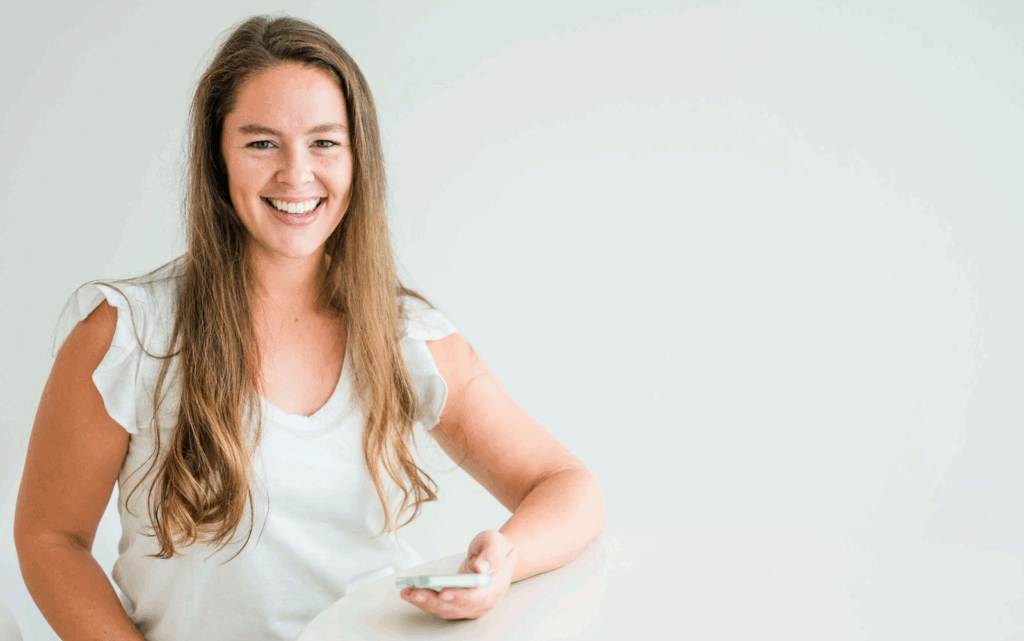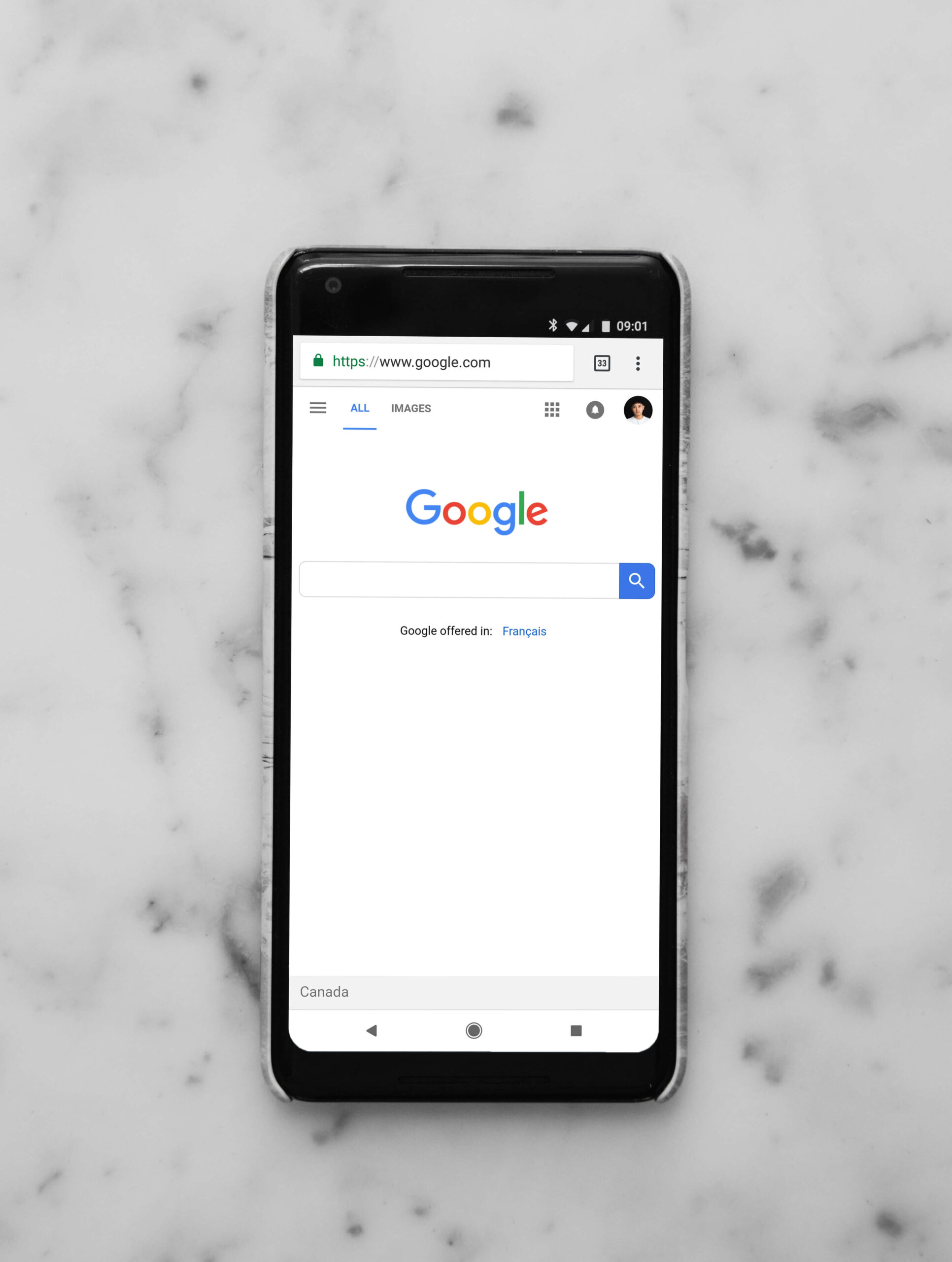That twinge on your side. That headache that won’t quit. After cancer, every new sensation feels loaded with meaning. Before you know it, you’re typing symptoms into Google at 2am, spiraling through search results that range from “totally normal” to “worst-case scenario.”
I know the pull is strong. You want answers and control. But here’s what I’ve learned as your oncology dietitian working with over 1,000 cancer survivors: that quick Google search rarely brings the peace you’re seeking. Instead, it often creates more anxiety and confusion.
In this article, we’ll explore why googling symptoms after cancer does more harm than good, and what you can do instead.
Get Your Free Clean Scan Plan!
Before we dive in, if you’re tired of the anxiety around every scan and symptom, I created something specifically for you. My Clean Scan Plan gives you a simple, science-backed roadmap to feel confident and in control with a nutrition plan between appointments.
Why Googling Symptoms Creates More Anxiety Than Answers?
When clients sign up for my programs or 1:1 coaching, they often ask about things they’ve found on Google. But there’s a big problem with trusting “Dr. Google” that most people miss.
Diseases are incredibly complex, and without proper medical training and your complete health history, it’s nearly impossible to accurately diagnose what’s happening.
Search engines don’t know about your specific condition, your treatment history, your current medications, or the late effects you might be experiencing.
Search algorithms are designed to show you content that gets the most clicks, not the most accurate information. That means worst-case scenarios and clickbait titles appear at the top.
A recent survey found that 43% of Americans misdiagnosed themselves after searching for symptoms online, and 74% said the results made them feel more worried. This phenomenon even has a name: cyberchondria.
As your oncology dietitian, I’ve watched countless clients fall into this trap. One survivor spent an entire week convinced her fatigue meant recurrence, only to discover she simply needed to adjust her iron levels.
The Unique Problem for Cancer Survivors
After a cancer diagnosis, your relationship with your body fundamentally changes. Every ache carries extra weight. You’re dealing with legitimate trauma and the very real fear of recurrence. The challenge is knowing the difference between late effects from treatment and normal aches.
41% of anxious cancer survivors meet criteria for generalized anxiety disorder, and 58% of anxiety disorders in cancer survivors began after their cancer diagnosis. This is a normal response to extraordinary circumstances. But Google reinforces the anxiety cycle instead of breaking it.
When you Google your symptoms and find information about recurrence, your anxiety spikes. That anxiety creates physical symptoms like increased heart rate and insomnia. You Google those new symptoms, and the cycle continues.
One of my clients shared: “When I started working with you, I was drained, anxious, and terrified of recurrence. I was spending hours every night googling every symptom. Working with you gave me my energy, my gut health, and my peace of mind back!”
If you’re ready for expert, personalized support, apply here for: VIP 1:1 Cancer nutrition & Lifestyle Coaching with me today.
How Google Actually Works? (And Why It Fails You)
Google uses complex algorithms to rank content based on website traffic and engagement, not medical accuracy. Alarming content gets more clicks, which means it appears higher in search results. This creates a perfect storm where the most anxiety-inducing information is exactly what you see first.
Research found that symptom checkers provided the correct diagnosis first only 34% of the time. These tools can’t account for your unique medical history, medications, or treatment timeline. The information you find might also be outdated or based on anecdotal experiences.
As your oncology dietitian who specializes in cancer nutrition, I see this confusion constantly. Clients come to me having read conflicting advice about foods and supplements, all from Google searches. Search engines simply cannot replace the personalized care and context that your medical team provides.
Stop the Anxiety Spiral
This is exactly why I created the Clean Scan Plan to give you a trusted resource instead of falling into the Google rabbit hole. You’ll get clear, science-backed strategies to support your body and calm your mind between scans.
The Real Dangers of Self-Diagnosis After Cancer
Beyond anxiety, self-diagnosing through Google creates tangible problems. Health anxiety drives unnecessary emergency room visits and medical tests.
On the flip side, some people avoid seeking necessary care because Dr. Google convinced them their symptoms weren’t serious. Missing crucial early warning signs because you trusted generic online advice over your instincts could have serious consequences.
Chronic health anxiety also takes a toll on your recovery. Stress can worsen pain, disrupt sleep, suppress immune function, and interfere with healing.
When you spend hours researching symptoms instead of resting or connecting with loved ones, you’re robbing yourself of the very experiences that support your recovery.
In my cancer healing vault program, I work with survivors to address the root causes of food anxiety and health fears. One client told me: “I spent months second-guessing every meal and googling every ingredient. Now I know exactly what supports my body, and the anxiety is gone.”
Breaking the Google Search Cycle
If you recognize yourself in this pattern, know that you can break free from it. Here are practical strategies that have helped my clients:
Set Time Limits
Set a timer for 10-15 minutes maximum when you feel the urge to research. Over time, gradually reduce this further. Track what triggers your searching to develop healthier coping strategies.
Use Distraction Techniques

When you feel the urge to Google symptoms, redirect that energy. Go for a walk, call a friend, or journal about your deeper fears. Addressing those fears directly is more effective than repeatedly searching for reassurance that never quite satisfies.
Talk to Professionals and Survivors
Your oncology team knows your specific case. Build a relationship where you feel comfortable reaching out with questions. Connect with other cancer survivors through support groups who truly understand.
If health anxiety is significantly impacting your daily life, consider working with a mental health professional. Cognitive behavioral therapy (CBT) has proven particularly effective for health anxiety.
How to Find Reliable Health Information Online?
I’m not saying you should never look up health information. I’m saying you need to be strategic about it. 72% of US adults have searched for health information online, and 35% have tried to self-diagnose. Here’s how to do it safely:
Check the “About Us” section for credentials. Look for registered dietitians, doctors, and established medical institutions.
Pay attention to publication dates. Prioritize .gov, .edu, and medical centers like Mayo Clinic. Most importantly, bring what you find to your oncology team.
Red Flags to Watch For
- Promises of “miracle cures” or “breakthroughs your doctor doesn’t want you to know”
- Demonizing specific foods without discussing dose or context
- No sources or references to back up claims
- Primarily selling supplements or products
- “This one weird trick” language or clickbait headlines
Why Working with Cancer Nutrition Experts Matters?
You don’t have to figure all of this out alone by googling endlessly. Working with qualified professionals who understand cancer nutrition can transform your experience from overwhelming to empowering.
As your oncology dietitian, my job isn’t just to tell you what to eat. It’s to help you understand why, address your specific fears, and give you tools that work for your unique situation.

In my programs, we go beyond just nutrition. We work on building confidence around food choices, addressing anxiety about recurrence, incorporating exercise and movement, managing stress, and reducing brain fog.
All five of these areas work together to help you build your strongest, happiest, and healthiest self. You’re not just getting information. You’re getting personalized support, accountability, and someone who genuinely understands the unique challenges cancer survivors face.
If you’re ready for expert, personalized support, apply here for: VIP 1:1 Cancer nutrition & Lifestyle Coaching with me today
You Can Feel Strong and Confident During and After Cancer
Here’s something I need you to hear: even though someone else is struggling, that does not mean that will be your experience. Each body is different.
It is absolutely possible to feel strong and confident during and after cancer treatment. This is how all of my clients feel. With the right support and science-backed strategies, you can build a lifestyle that supports your health while allowing you to actually enjoy your life.
One of my clients beautifully captured this: “For the first time since cancer, I feel in control, confident, and deeply supported. This wasn’t just nutrition coaching. It was a lifeline that gave me back my peace of mind.”
Release the Need to Google Everything
You don’t have to feel ashamed if you’re prone to googling symptoms after cancer. It’s completely understandable. Being diagnosed with cancer is traumatic. The fear that comes with “you have cancer” can feel like “you’re going to die,” and that’s terrifying.
The endless desire to research makes perfect sense. You’re trying to regain control. But spending hours googling isn’t giving you control. It’s stealing your present moment, your relationships, and the life you deserve to be living right now.
Remember: cancer is not your fault. Lean into the idea that you won’t get cancer again. Focus on what you CAN control: your nutrition, movement, stress management, sleep, and self-care. These five pillars work together to reduce your risk and help you feel your best.
Work with professionals like me who can guide you with evidence-based strategies. Connect with other survivors who understand. Give yourself permission to stop being your own researcher and invest that energy in living your life.
It’s okay to google sometimes, but don’t let it consume you. You deserve to enjoy your life, free from the constant anxiety that Dr. Google creates.
References
- https://etactics.com/blog/stop-googling-symptoms
- https://pmc.ncbi.nlm.nih.gov/articles/PMC7347435/
- https://www.frontiersin.org/journals/psychiatry/articles/10.3389/fpsyt.2024.1422540/full
- https://www.goodrx.com/health-topic/mental-health/google-medical-search-dangers
- https://www.cancer.gov/about-cancer/coping/feelings/anxiety-distress-pdq
- https://www.ngpg.org/dr-google-why-you-should-not-google-your-symptoms




